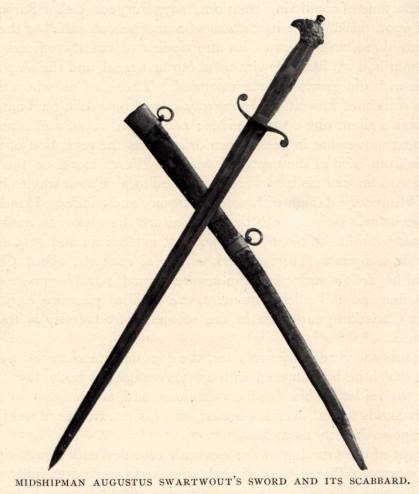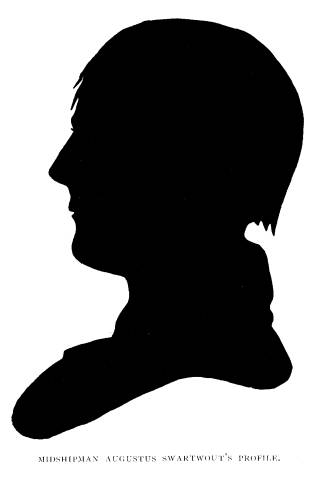|
Naval
Service |
|||
| |
Midshipman - An Officer-in-training, it is currently used to refer to Naval personnel assigned by appointment of the President or a member of Congress to the US Naval Academy or Naval Reserve Officers' Training Corps. Successful completion of the training will results in receiving a commission as an Ensign in the US Navy.
 Thomas Swartwout -The first person surnamed Swartwout to enter the naval service of the United States, it seems, was Thomas, the fourth son of Colonel Barnardus and Mary Brower Swartwout. On May 28, 1800, when fifteen years old, he was appointed by President John Adams a midshipman and assigned to the New York,[1] Captain Robertson, carrying thirty-six guns. From that vessel he was transferred to the frigate Essex, of thirty-two guns, Captain William Bainbridge, commandant. The secretary of the navy, having, on the twentieth of May, 1801, ordered the frigates President, Commodore Richard Dale, Philadelphia, Captain Samuel Barron, Essex, Captain William Bainbridge, and the schooner Enterprise, Lieutenant-Commandant Andrew Sterrett, to be prepared for sea, Captain Bainbridge immediately proceeded to New York city to superintend the equipment of the Essex. As soon as the squadron was ready for sea-service, it sailed from Hampton Roads for the Mediterranean, where it was sent to protect the merchant vessels of the United States against the cruisers of the bashaw of Tripoli. On the arrival of the squadron in the Mediterranean, Captain Bainbridge, by the order of Commodore Dale, cruised off the ports of Algiers, Tunis, and Tripoli, and during the winter and spring of 1802 convoyed the United States merchantmen across the sea in safety to their various destinations. Unhappily for Midshipman Swartwout a personal difference between him and James S. Higinbothom, also a midshipman on board the Essex, led to a duel, and he was killed by his opponent. The unseaworthiness of the Essex caused Captain Bainbridge to be ordered to return to the United States with the frigate, and he arrived at the port of New York on the twenty-second of July, 1802. In a letter of inquiry, dated "New York, July 24, 1802," addressed to Captain Bainbridge, Colonel Swartwout wrote: "Being the father of that very unfortunate young man, Mr. Thomas Swartwout, late a midshipman under your orders, who, while engaged in an honor able pursuit--that of serving his country--fell a victim to the (false) laws of honor to the great affliction of his relatives, * * * * I therefore take the liberty, sir, to ask the favor that you will direct the purser to exhibit his account with the deceased, and to pay me whatever may be due, or to instruct me where to apply for it." The sympathetic officer at once answered with the following communication: "New York, 25 July, 1802. "Sir:--I have received your letter respecting the wages of your unfortunate son, Mr. Thomas Swartwout, who unknown to me, and contrary to the expressed discipline of the ship under my command, at Algeciras, on the 30th of March, met and fought with Mr. Higinbothom, midshipman, on board the same ship, and unfortunately fell. "I endeavored to have him interred at Gibraltar, supposing it would be more gratifying to the feelings of his relatives to have him buried in an English place, but I could not obtain permission. He was laid at Algeciras,[1] in Fort St. Jago. His clothes were taken charge of by a midshipman by his particular request. "I shall instruct Mr. [Timothy] Winn, the purser, to settle his account with you. "I am very respectfully, sir, "Your most obt. servant, "WM. BAINBRIDGE. Pictures and Bibliography from the Swartwout Chronicles. |
||
|

